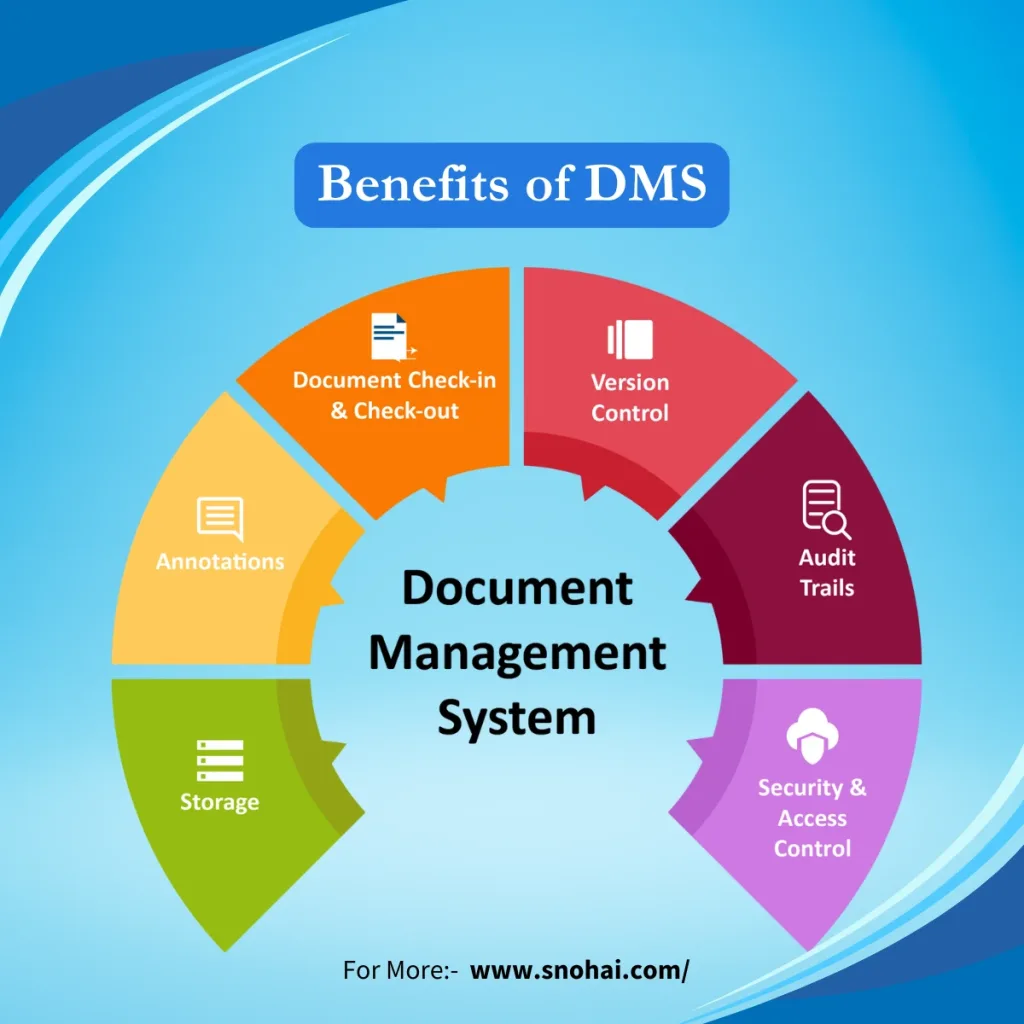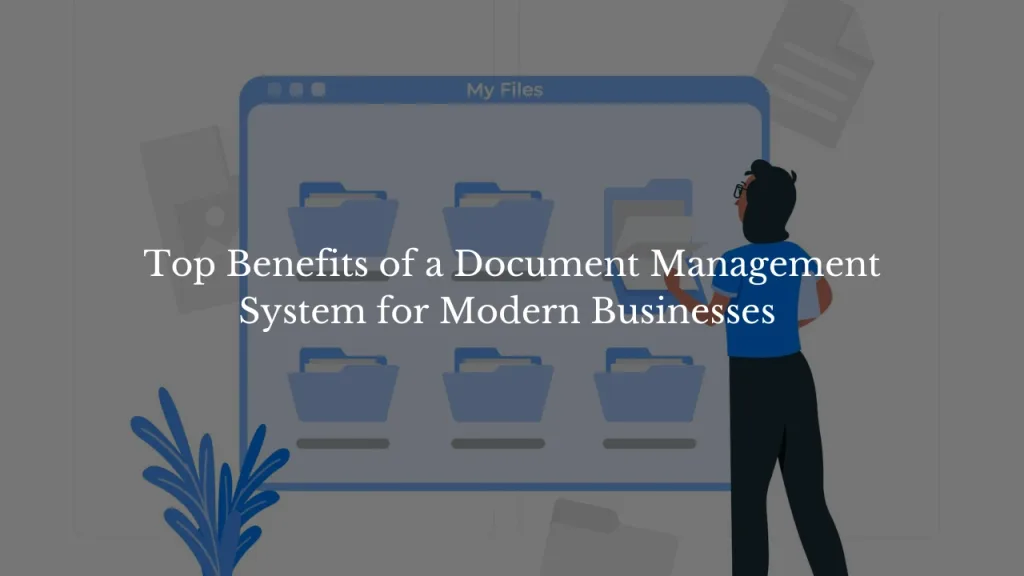In a world where technology is rampant, Document Management Systems have been created to streamline the process of managing documents. Gone are the days of traditional paper-based systems. They were lightly scaled, prone to errors, and very time-consuming. To gain a competitive edge in today’s world, efficient document management is imperative for every organization.
Table of Contents
What is a Document Management System (DMS)?
A Document Management System search is a kind of software that manages the entire life cycle of a given document. It increasingly becomes vital for mid-size businesses and small businesses, as it reduces the need for physical document storage and therefore cuts down on collaboration roadblocks.
No matter the size of your business deploying a document management system will enhance your company’s capacity while ensuring industry standards are met.

1. Enhanced Document Accessibility
The accessibility of clearly defined documents is one of the greatest drawbacks of a DMS. Finding a specific document in a manual environment could take an unreasonable amount of time. A DMS Provides a clearer environment in that:
- Files are available at any time and from any place in the cloud.
- Files may be retrieved via robust search features using metadata, keywords, or content.
So, for instance, a sales team may greatly improve customer service and make effective decisions by quickly retrieving client contracts or invoices during a client conversation.
2. Improved Organization and Storage
In many businesses and organizations, reliance on paper-based systems will often result in disorganized filing and misplaced vital documents. With the help of software that manages documents, a centralized storage space is made for every document which is indexed in an organized manner. Some of the key advantages are as follows:
- Folder structures and tag options provide easy arranging features.
- Automatic version control ensures that document edits and changes are recorded.
- Clutter is minimized to a larger extent as all documents are kept in electronic form thus saving physical office space.
3. Increased Security and Compliance
For firms, data breaches and compliance violations are worst-case scenarios. The implementation of legal policies or rules enables an organization to comply with the law. Organizations, on the other hand, provide a high level of security for sensitive data with the features of DMS systems, including:
- Control over access: Restriction of access to the document to the authorized users only.
- Audit trail: Keeping a history of who read or edited the document so no one abuses their power.
- Encryption: Ensuring that data is protected in the case of storage or transfer.
Furthermore, a DMS allows firms to meet the relevant criteria required by the law such as GDPR or HIPAA by performing compliance checks and protection of the sensitive data.
4. Streamlined Workflow Automation
A Document Management System nowadays is not just about saving documents; it also helps to streamline processes. Such as:
- Expedite document approvals, thereby lowering the lag in procedures such as contract management or expense reporting.
- Provide alerts for important activities for example policy renewals or audits.
- Allow integration with other tools like CRM or ERP systems.
These functions eliminate bottlenecks, increase the efficiency of the business, and enable tasks to be done on time.
5. Cost Savings
Once you transition to a DMS, you will notice drastic cost reductions across the board due to the following reasons:
- Decreased paper consumption: There will be no need for physical documents, printers or storage as paperwork will be entirely digitized.
- Decreased manual effort: Filing, copying, retrieving, and other document-related manual tasks are costly in both time and money.
- Higher details focus: Employees’ concentration shifts on what is essential rather than on what is not.
In the long run, the I DMS system serves as a cost-efficient tool suitable for use by businesses regardless of size.
6. Enhanced Collaboration
Because remote and hybrid work has become more accepted than it used to, teamwork has become an essential component of today’s work environment. Pavel et al. (2014) describe that teamwork is greatly enhanced by a DMS.
- Permitting the simultaneous access, editing, and sharing of documents by several users.
- Keeping a record of all changes made to ensure that all users are viewing the most recent file.
- Allowing comments and annotations to be made in real-time to speed up feedback.
As an example, a marketing team running a campaign may jointly edit the proposal document without getting in each other’s way or spending time unnecessarily.
7. Disaster Recovery and Backup
Crucial information can be lost due to natural calamities, cyber crimes, or accidental deletion. A DMS alleviates these risks by:
- Encrypting documents and storing them in secure cloud-based virtual space or on-site.
- Allowing data loss recovery tools to be used in case of data deletion.
This allows for uninterrupted operations within the organization even if the worst-case scenario takes place.
8. Scalability and Flexibility
The more a business escalates, the more its document volume fluctuates. A DMS is structurally designed to:
- Handle growth in data without degrading performance.
- Modify or increase the number of users and tailor functionalities as needed.
- Provide scope for integration with new technologies like AI for smart document processing.
This versatility guarantees that the DMS is applicable as a business develops.
9. Eco-Friendly Solution
Using a DMS is a good step towards protecting natural resources since paper usage gets reduced and businesses become more sustainable. There are many advantages of this:
- Reduced need for printing and storage space therefore reducing the carbon footprint by a considerable amount.
- Fair integration with the social responsibility initiatives of the firm.
10. Competitive Advantage
In the end, a DMS offers businesses a competitive advantage. Through improvements, document security, and enhanced decision-making, companies can:
- Be more agile in the marketplace
- Enhance customer care through quicker service and more effective solutions
- Shift priorities towards new ideas from trivial management activities
Any business that gets the most out of a DMS significantly enhances its chances of beating its rivals in the current digital environment.
Choosing the Right DMS for Your Business
Key points to note when looking to acquire a Document Management System include the following:
- Cloud-based or On-Site: Evaluate if you need the versatility of having access to a cloud-based solution or if you want a solution hosted at your premises.
- Compatibility: Make sure the DMS you opt for works in conjunction with any other tools or software you are currently using.
- User Experience: Opt for an intuitive interface so that your employees can make use of the software you have employed.
- Tailoring: Try to find a service or system which lets you incorporate features facet that best fit your business requirements
Conclusion
In the present times, efficiency, security, and agility are important for all modern businesses ao, a Document Management System is no longer an option or a luxury. It has become essential; considering the various perks it offers like improved collaboration, enhanced accessibility and even cost savings alongside workflow automation.
Those organizations which integrate DMS into their working process can revolutionize their document management approach. Such integration ensures that the organization remains competitive in the ever-evolving tech-driven society. The future and an effective way in which document management can be carried out is through a digital, safe and intelligent system.


Pingback: 10 Step Guide to Implementing a Document Management System in Your Business - SnohAI